Mindfulness Based Cognitive Therapy: Applications and Effectiveness
VerifiedAdded on 2023/05/30
|6
|1286
|281
Essay
AI Summary
This essay provides an overview of Mindfulness Based Cognitive Therapy (MBCT), a therapeutic approach used to treat mental illnesses, particularly depression. The essay defines MBCT as a modified form of cognitive therapy that incorporates mindfulness practices such as breathing exercises and meditation to help individuals manage negative thoughts and prevent relapse. It explains how MBCT combines mindfulness training and cognitive behavioral therapy to provide insights into emotions and thoughts, offering relief during distress. The essay details the techniques used in MBCT, including meditation and mindfulness breathing, and their benefits in interrupting and reducing triggers of depressive thoughts. It highlights the advantages of meditation, such as its lack of harmful side effects and its ability to prevent brooding and instill positive thoughts. Furthermore, it concludes by emphasizing the effectiveness of MBCT as a self-care method, supported by scientific evidence, and its use of cognitive behavioral techniques and relaxation methods to manage negative thoughts and mood disorders. The essay also includes a references page with citations from various sources to support the claims made in the paper.
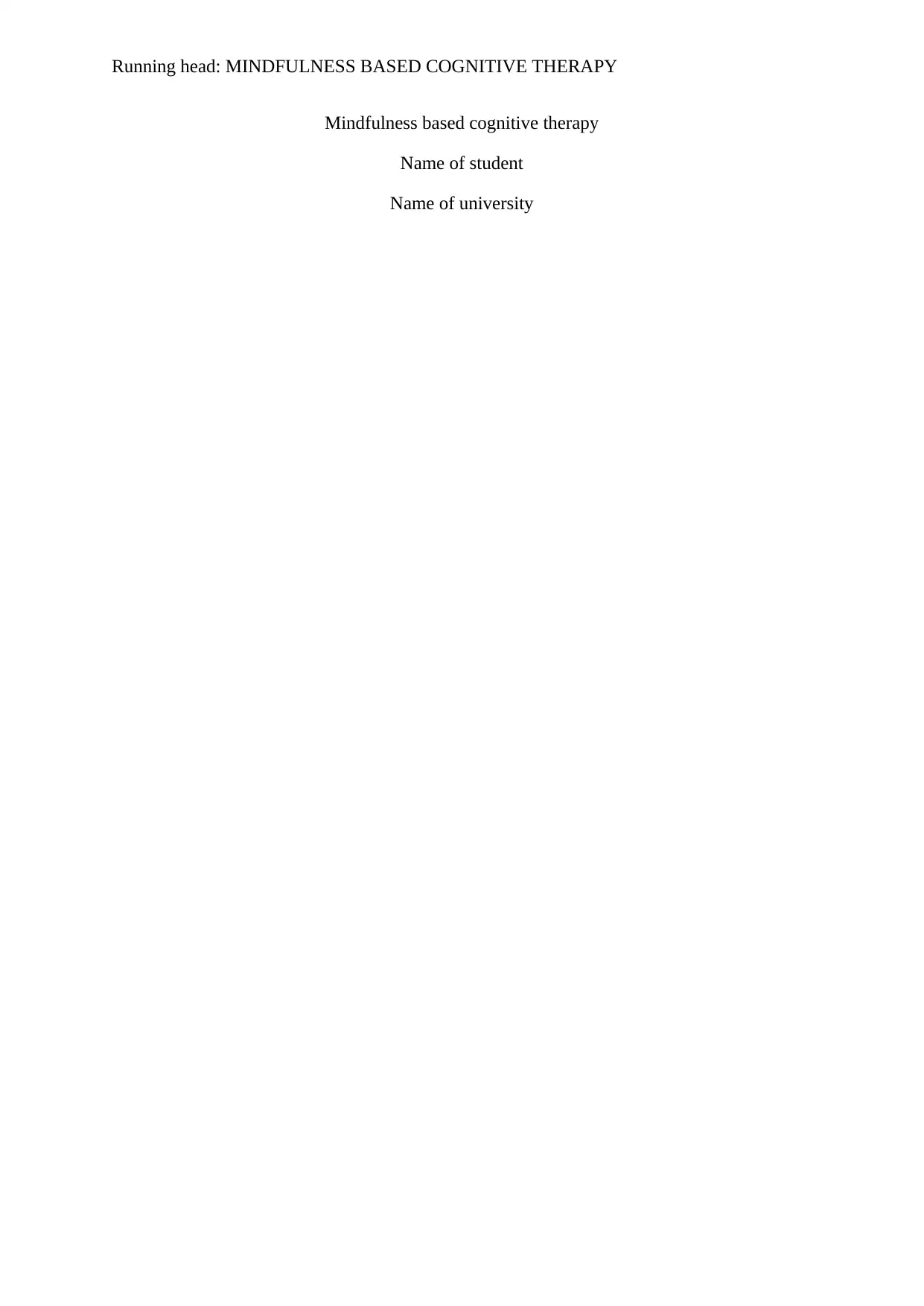
Running head: MINDFULNESS BASED COGNITIVE THERAPY
Mindfulness based cognitive therapy
Name of student
Name of university
Mindfulness based cognitive therapy
Name of student
Name of university
Paraphrase This Document
Need a fresh take? Get an instant paraphrase of this document with our AI Paraphraser
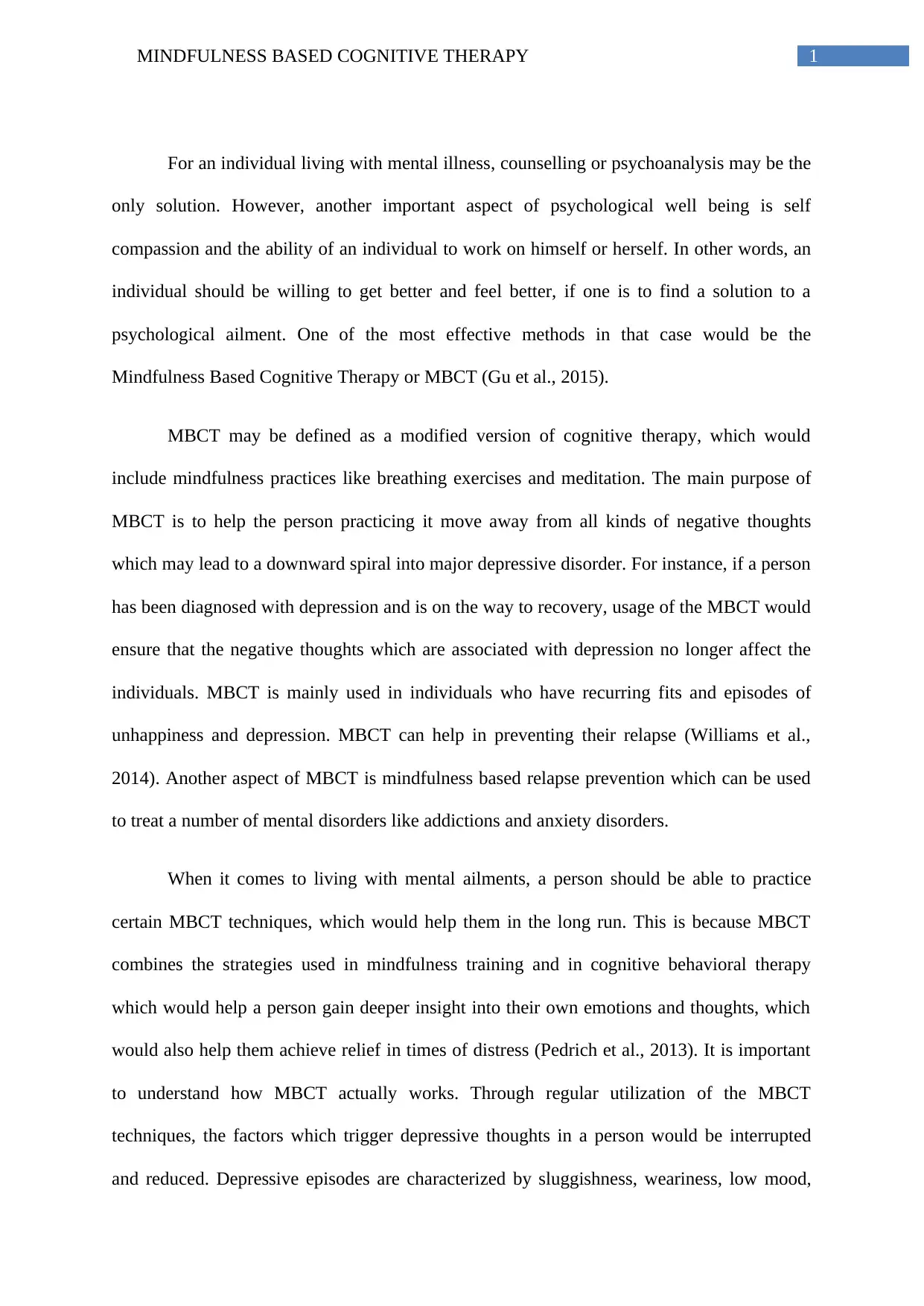
1MINDFULNESS BASED COGNITIVE THERAPY
For an individual living with mental illness, counselling or psychoanalysis may be the
only solution. However, another important aspect of psychological well being is self
compassion and the ability of an individual to work on himself or herself. In other words, an
individual should be willing to get better and feel better, if one is to find a solution to a
psychological ailment. One of the most effective methods in that case would be the
Mindfulness Based Cognitive Therapy or MBCT (Gu et al., 2015).
MBCT may be defined as a modified version of cognitive therapy, which would
include mindfulness practices like breathing exercises and meditation. The main purpose of
MBCT is to help the person practicing it move away from all kinds of negative thoughts
which may lead to a downward spiral into major depressive disorder. For instance, if a person
has been diagnosed with depression and is on the way to recovery, usage of the MBCT would
ensure that the negative thoughts which are associated with depression no longer affect the
individuals. MBCT is mainly used in individuals who have recurring fits and episodes of
unhappiness and depression. MBCT can help in preventing their relapse (Williams et al.,
2014). Another aspect of MBCT is mindfulness based relapse prevention which can be used
to treat a number of mental disorders like addictions and anxiety disorders.
When it comes to living with mental ailments, a person should be able to practice
certain MBCT techniques, which would help them in the long run. This is because MBCT
combines the strategies used in mindfulness training and in cognitive behavioral therapy
which would help a person gain deeper insight into their own emotions and thoughts, which
would also help them achieve relief in times of distress (Pedrich et al., 2013). It is important
to understand how MBCT actually works. Through regular utilization of the MBCT
techniques, the factors which trigger depressive thoughts in a person would be interrupted
and reduced. Depressive episodes are characterized by sluggishness, weariness, low mood,
For an individual living with mental illness, counselling or psychoanalysis may be the
only solution. However, another important aspect of psychological well being is self
compassion and the ability of an individual to work on himself or herself. In other words, an
individual should be willing to get better and feel better, if one is to find a solution to a
psychological ailment. One of the most effective methods in that case would be the
Mindfulness Based Cognitive Therapy or MBCT (Gu et al., 2015).
MBCT may be defined as a modified version of cognitive therapy, which would
include mindfulness practices like breathing exercises and meditation. The main purpose of
MBCT is to help the person practicing it move away from all kinds of negative thoughts
which may lead to a downward spiral into major depressive disorder. For instance, if a person
has been diagnosed with depression and is on the way to recovery, usage of the MBCT would
ensure that the negative thoughts which are associated with depression no longer affect the
individuals. MBCT is mainly used in individuals who have recurring fits and episodes of
unhappiness and depression. MBCT can help in preventing their relapse (Williams et al.,
2014). Another aspect of MBCT is mindfulness based relapse prevention which can be used
to treat a number of mental disorders like addictions and anxiety disorders.
When it comes to living with mental ailments, a person should be able to practice
certain MBCT techniques, which would help them in the long run. This is because MBCT
combines the strategies used in mindfulness training and in cognitive behavioral therapy
which would help a person gain deeper insight into their own emotions and thoughts, which
would also help them achieve relief in times of distress (Pedrich et al., 2013). It is important
to understand how MBCT actually works. Through regular utilization of the MBCT
techniques, the factors which trigger depressive thoughts in a person would be interrupted
and reduced. Depressive episodes are characterized by sluggishness, weariness, low mood,
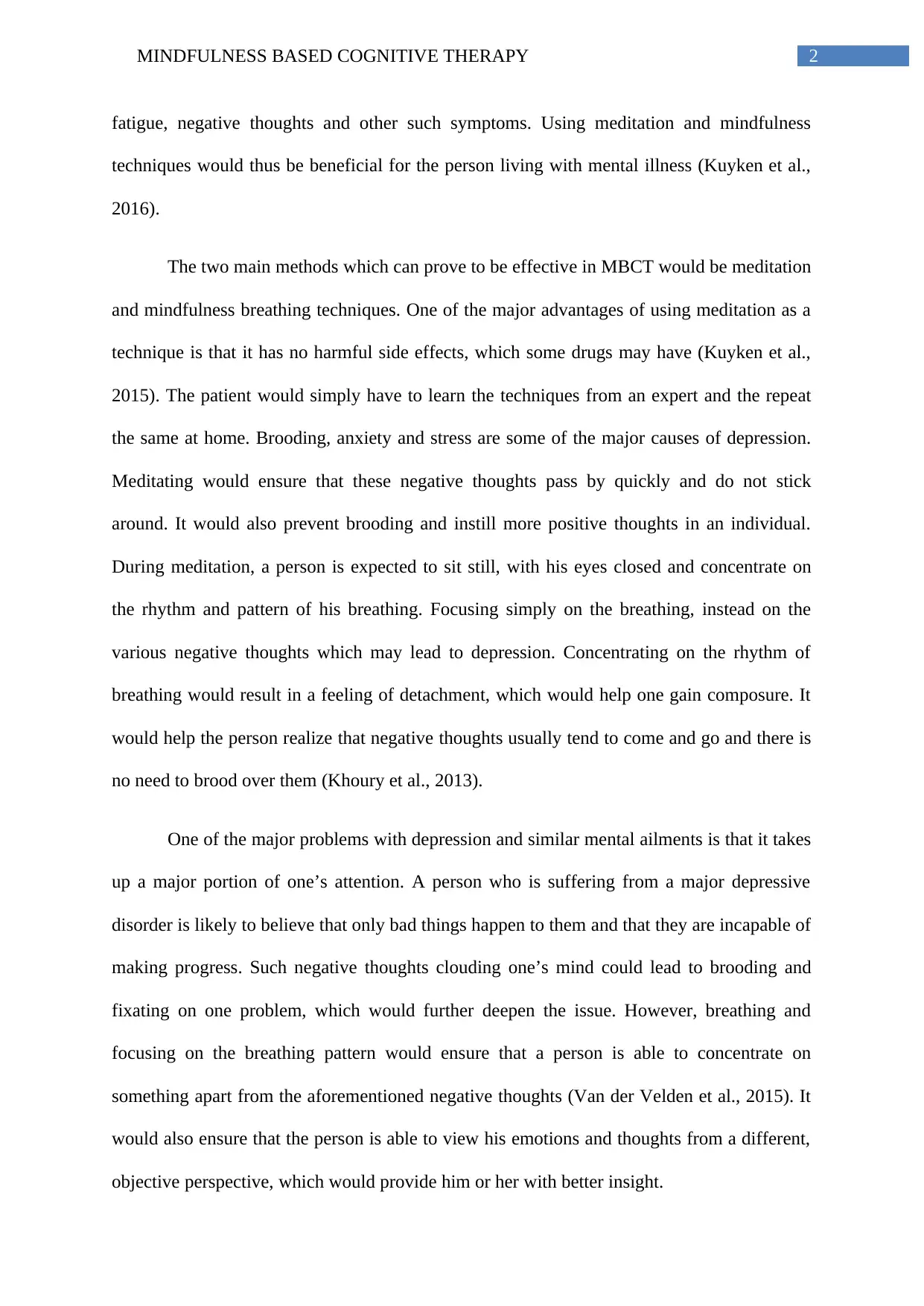
2MINDFULNESS BASED COGNITIVE THERAPY
fatigue, negative thoughts and other such symptoms. Using meditation and mindfulness
techniques would thus be beneficial for the person living with mental illness (Kuyken et al.,
2016).
The two main methods which can prove to be effective in MBCT would be meditation
and mindfulness breathing techniques. One of the major advantages of using meditation as a
technique is that it has no harmful side effects, which some drugs may have (Kuyken et al.,
2015). The patient would simply have to learn the techniques from an expert and the repeat
the same at home. Brooding, anxiety and stress are some of the major causes of depression.
Meditating would ensure that these negative thoughts pass by quickly and do not stick
around. It would also prevent brooding and instill more positive thoughts in an individual.
During meditation, a person is expected to sit still, with his eyes closed and concentrate on
the rhythm and pattern of his breathing. Focusing simply on the breathing, instead on the
various negative thoughts which may lead to depression. Concentrating on the rhythm of
breathing would result in a feeling of detachment, which would help one gain composure. It
would help the person realize that negative thoughts usually tend to come and go and there is
no need to brood over them (Khoury et al., 2013).
One of the major problems with depression and similar mental ailments is that it takes
up a major portion of one’s attention. A person who is suffering from a major depressive
disorder is likely to believe that only bad things happen to them and that they are incapable of
making progress. Such negative thoughts clouding one’s mind could lead to brooding and
fixating on one problem, which would further deepen the issue. However, breathing and
focusing on the breathing pattern would ensure that a person is able to concentrate on
something apart from the aforementioned negative thoughts (Van der Velden et al., 2015). It
would also ensure that the person is able to view his emotions and thoughts from a different,
objective perspective, which would provide him or her with better insight.
fatigue, negative thoughts and other such symptoms. Using meditation and mindfulness
techniques would thus be beneficial for the person living with mental illness (Kuyken et al.,
2016).
The two main methods which can prove to be effective in MBCT would be meditation
and mindfulness breathing techniques. One of the major advantages of using meditation as a
technique is that it has no harmful side effects, which some drugs may have (Kuyken et al.,
2015). The patient would simply have to learn the techniques from an expert and the repeat
the same at home. Brooding, anxiety and stress are some of the major causes of depression.
Meditating would ensure that these negative thoughts pass by quickly and do not stick
around. It would also prevent brooding and instill more positive thoughts in an individual.
During meditation, a person is expected to sit still, with his eyes closed and concentrate on
the rhythm and pattern of his breathing. Focusing simply on the breathing, instead on the
various negative thoughts which may lead to depression. Concentrating on the rhythm of
breathing would result in a feeling of detachment, which would help one gain composure. It
would help the person realize that negative thoughts usually tend to come and go and there is
no need to brood over them (Khoury et al., 2013).
One of the major problems with depression and similar mental ailments is that it takes
up a major portion of one’s attention. A person who is suffering from a major depressive
disorder is likely to believe that only bad things happen to them and that they are incapable of
making progress. Such negative thoughts clouding one’s mind could lead to brooding and
fixating on one problem, which would further deepen the issue. However, breathing and
focusing on the breathing pattern would ensure that a person is able to concentrate on
something apart from the aforementioned negative thoughts (Van der Velden et al., 2015). It
would also ensure that the person is able to view his emotions and thoughts from a different,
objective perspective, which would provide him or her with better insight.
⊘ This is a preview!⊘
Do you want full access?
Subscribe today to unlock all pages.

Trusted by 1+ million students worldwide
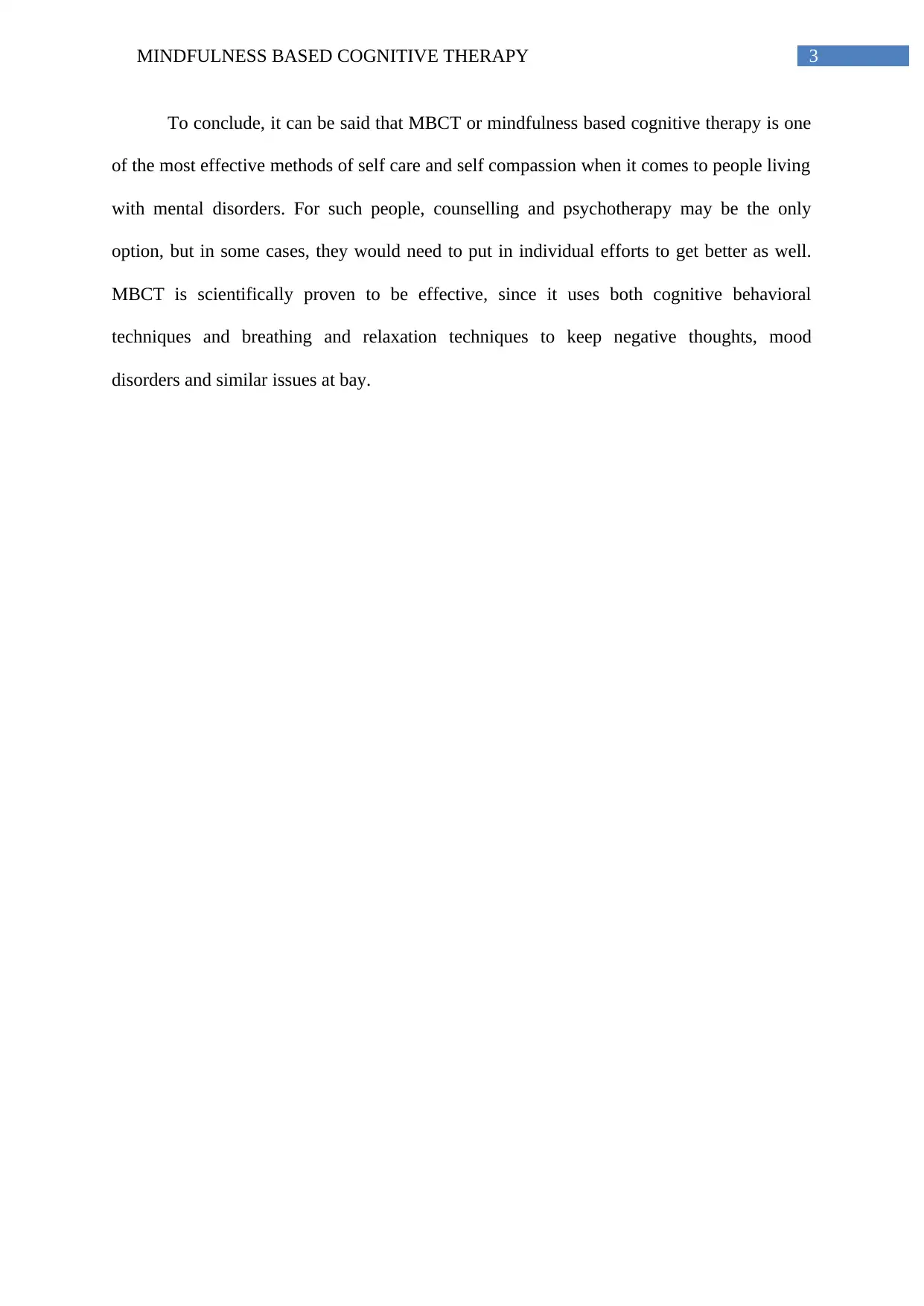
3MINDFULNESS BASED COGNITIVE THERAPY
To conclude, it can be said that MBCT or mindfulness based cognitive therapy is one
of the most effective methods of self care and self compassion when it comes to people living
with mental disorders. For such people, counselling and psychotherapy may be the only
option, but in some cases, they would need to put in individual efforts to get better as well.
MBCT is scientifically proven to be effective, since it uses both cognitive behavioral
techniques and breathing and relaxation techniques to keep negative thoughts, mood
disorders and similar issues at bay.
To conclude, it can be said that MBCT or mindfulness based cognitive therapy is one
of the most effective methods of self care and self compassion when it comes to people living
with mental disorders. For such people, counselling and psychotherapy may be the only
option, but in some cases, they would need to put in individual efforts to get better as well.
MBCT is scientifically proven to be effective, since it uses both cognitive behavioral
techniques and breathing and relaxation techniques to keep negative thoughts, mood
disorders and similar issues at bay.
Paraphrase This Document
Need a fresh take? Get an instant paraphrase of this document with our AI Paraphraser
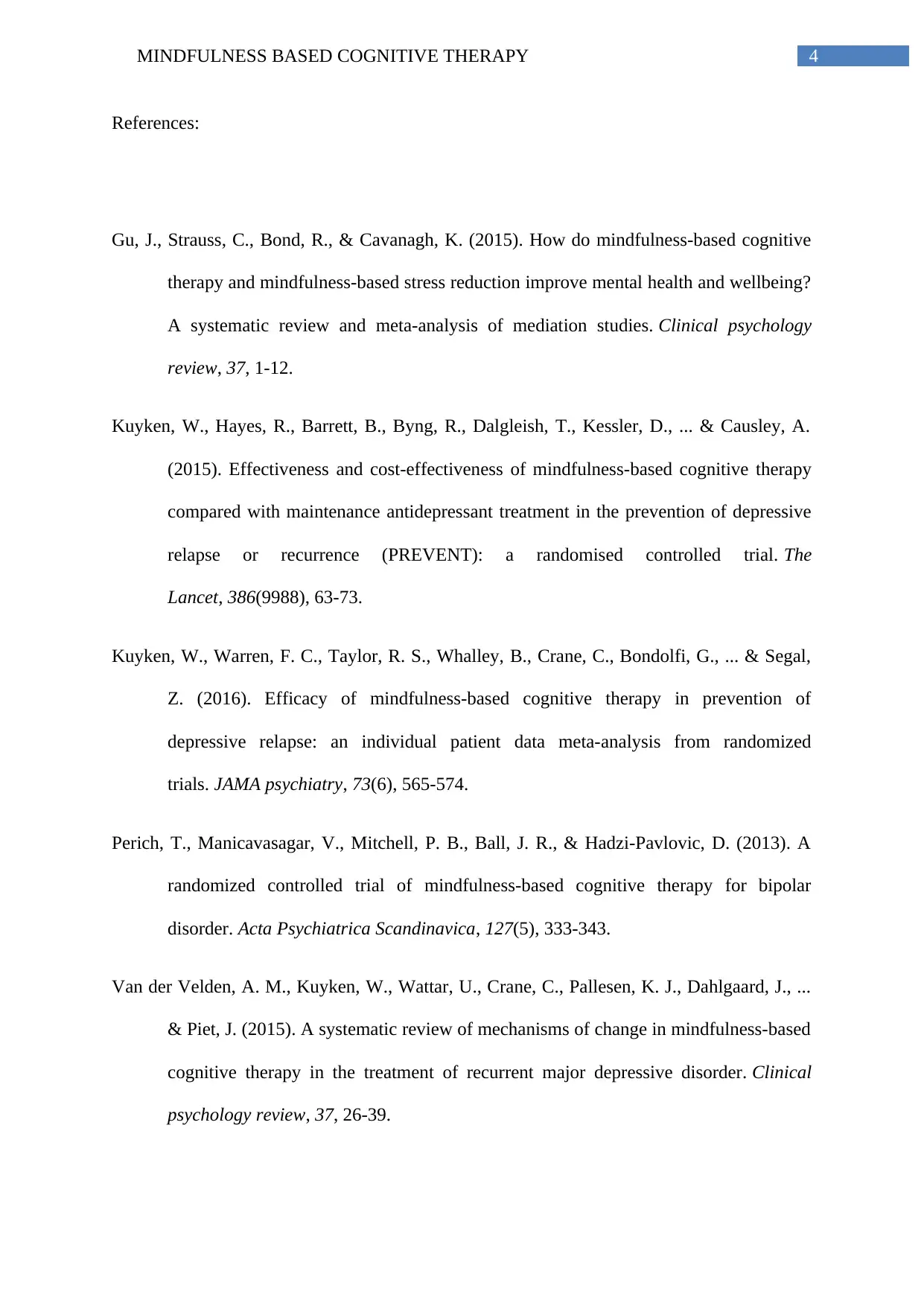
4MINDFULNESS BASED COGNITIVE THERAPY
References:
Gu, J., Strauss, C., Bond, R., & Cavanagh, K. (2015). How do mindfulness-based cognitive
therapy and mindfulness-based stress reduction improve mental health and wellbeing?
A systematic review and meta-analysis of mediation studies. Clinical psychology
review, 37, 1-12.
Kuyken, W., Hayes, R., Barrett, B., Byng, R., Dalgleish, T., Kessler, D., ... & Causley, A.
(2015). Effectiveness and cost-effectiveness of mindfulness-based cognitive therapy
compared with maintenance antidepressant treatment in the prevention of depressive
relapse or recurrence (PREVENT): a randomised controlled trial. The
Lancet, 386(9988), 63-73.
Kuyken, W., Warren, F. C., Taylor, R. S., Whalley, B., Crane, C., Bondolfi, G., ... & Segal,
Z. (2016). Efficacy of mindfulness-based cognitive therapy in prevention of
depressive relapse: an individual patient data meta-analysis from randomized
trials. JAMA psychiatry, 73(6), 565-574.
Perich, T., Manicavasagar, V., Mitchell, P. B., Ball, J. R., & Hadzi‐Pavlovic, D. (2013). A
randomized controlled trial of mindfulness‐based cognitive therapy for bipolar
disorder. Acta Psychiatrica Scandinavica, 127(5), 333-343.
Van der Velden, A. M., Kuyken, W., Wattar, U., Crane, C., Pallesen, K. J., Dahlgaard, J., ...
& Piet, J. (2015). A systematic review of mechanisms of change in mindfulness-based
cognitive therapy in the treatment of recurrent major depressive disorder. Clinical
psychology review, 37, 26-39.
References:
Gu, J., Strauss, C., Bond, R., & Cavanagh, K. (2015). How do mindfulness-based cognitive
therapy and mindfulness-based stress reduction improve mental health and wellbeing?
A systematic review and meta-analysis of mediation studies. Clinical psychology
review, 37, 1-12.
Kuyken, W., Hayes, R., Barrett, B., Byng, R., Dalgleish, T., Kessler, D., ... & Causley, A.
(2015). Effectiveness and cost-effectiveness of mindfulness-based cognitive therapy
compared with maintenance antidepressant treatment in the prevention of depressive
relapse or recurrence (PREVENT): a randomised controlled trial. The
Lancet, 386(9988), 63-73.
Kuyken, W., Warren, F. C., Taylor, R. S., Whalley, B., Crane, C., Bondolfi, G., ... & Segal,
Z. (2016). Efficacy of mindfulness-based cognitive therapy in prevention of
depressive relapse: an individual patient data meta-analysis from randomized
trials. JAMA psychiatry, 73(6), 565-574.
Perich, T., Manicavasagar, V., Mitchell, P. B., Ball, J. R., & Hadzi‐Pavlovic, D. (2013). A
randomized controlled trial of mindfulness‐based cognitive therapy for bipolar
disorder. Acta Psychiatrica Scandinavica, 127(5), 333-343.
Van der Velden, A. M., Kuyken, W., Wattar, U., Crane, C., Pallesen, K. J., Dahlgaard, J., ...
& Piet, J. (2015). A systematic review of mechanisms of change in mindfulness-based
cognitive therapy in the treatment of recurrent major depressive disorder. Clinical
psychology review, 37, 26-39.
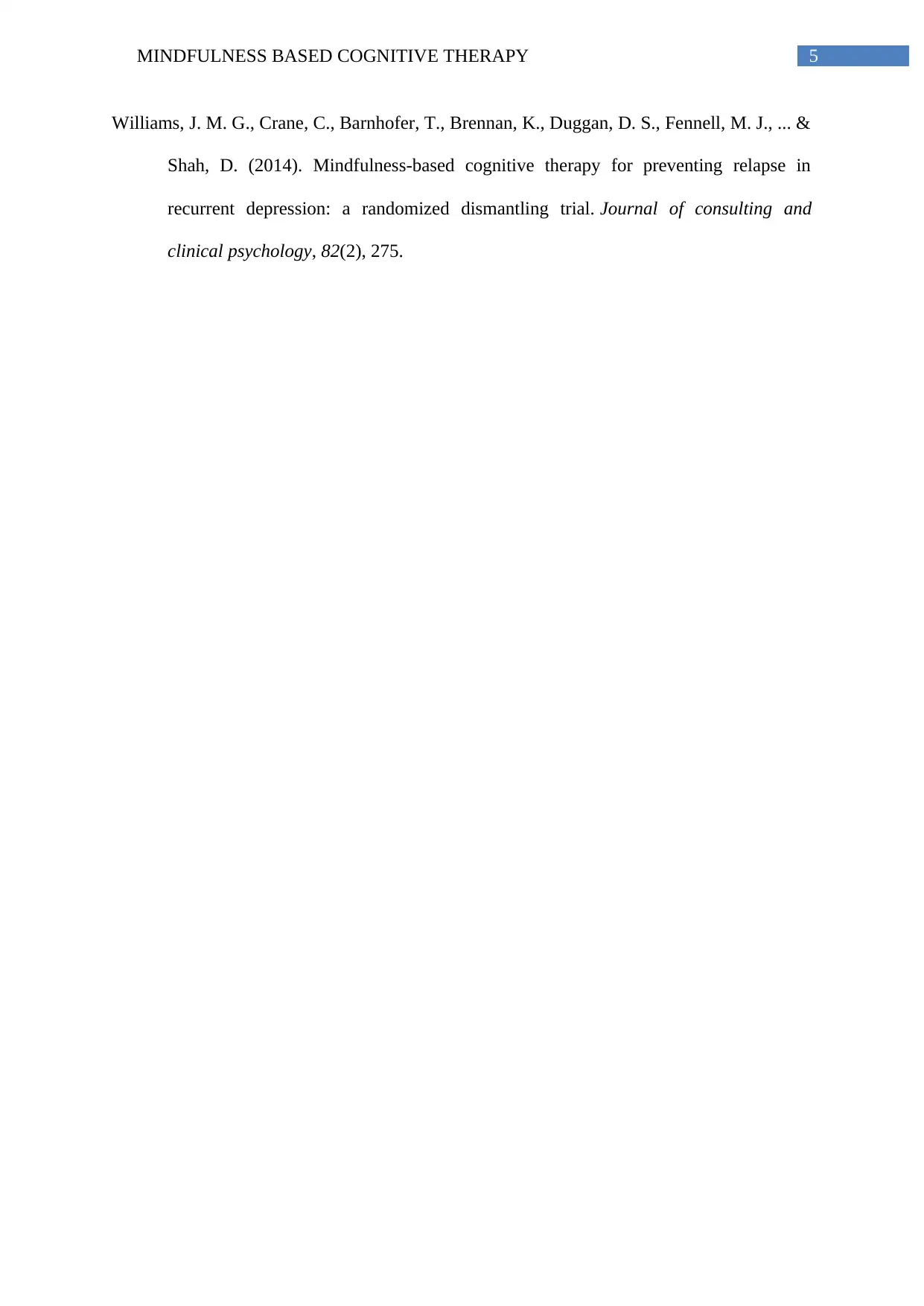
5MINDFULNESS BASED COGNITIVE THERAPY
Williams, J. M. G., Crane, C., Barnhofer, T., Brennan, K., Duggan, D. S., Fennell, M. J., ... &
Shah, D. (2014). Mindfulness-based cognitive therapy for preventing relapse in
recurrent depression: a randomized dismantling trial. Journal of consulting and
clinical psychology, 82(2), 275.
Williams, J. M. G., Crane, C., Barnhofer, T., Brennan, K., Duggan, D. S., Fennell, M. J., ... &
Shah, D. (2014). Mindfulness-based cognitive therapy for preventing relapse in
recurrent depression: a randomized dismantling trial. Journal of consulting and
clinical psychology, 82(2), 275.
⊘ This is a preview!⊘
Do you want full access?
Subscribe today to unlock all pages.

Trusted by 1+ million students worldwide
1 out of 6
Related Documents
Your All-in-One AI-Powered Toolkit for Academic Success.
+13062052269
info@desklib.com
Available 24*7 on WhatsApp / Email
![[object Object]](/_next/static/media/star-bottom.7253800d.svg)
Unlock your academic potential
Copyright © 2020–2026 A2Z Services. All Rights Reserved. Developed and managed by ZUCOL.





